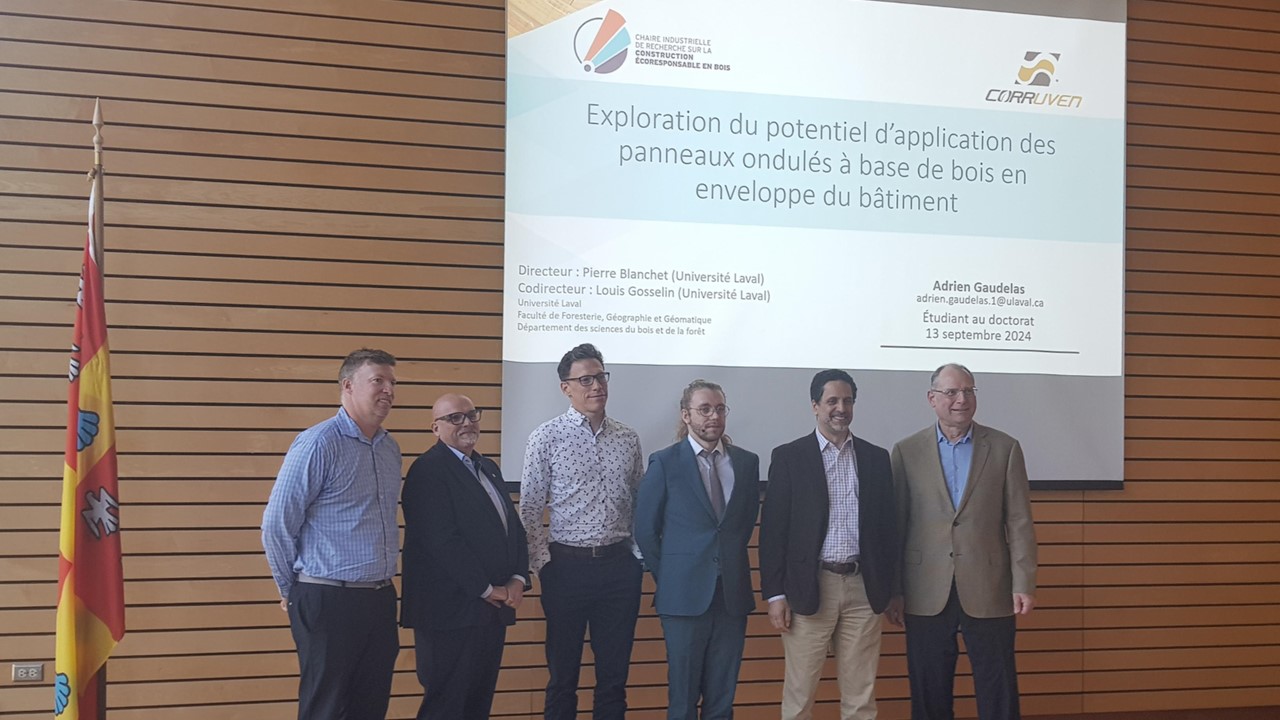Congratulations to Adrien Gaudelas on his successful doctoral defense!
Congratulations to Adrien Gaudelas on successfully defending his doctoral thesis in wood and bio-based materials engineering on September 13, 2024, under the supervision of Pierre Blanchet (Faculty of Forestry, Geography and Geomatics, Laval University) and the co-supervision of Louis Gosselin (Faculty of Science and Engineering, Laval University). His thesis explores the potential of corrugated wood panels as an innovative solution for building envelopes, in a context of increasingly stringent environmental and sustainability requirements.
Congratulations, Adrien, on this remarkable milestone in your academic career! We wish you a bright future, filled with professional success and numerous achievements.
The jury members were: Mr. André Desrochers (President, FFGG), Mr. Pierre Blanchet (Research Director – FFGG), Mr. Louis Gosselin (Co-Research Director – FSG), Mr. André Bégin-Drolet (UL Examiner – FSG), Mr. Alain Cloutier (UL Examiner – FFGG) and Mr. Wahid Maref (External Examiner – École Polytechnique de Montréal).

From left to right: André Bégin-Drolet, Pierre Blanchet, Louis Gosselin, Adrien Gaudelas, Wahid Maref and Alain Cloutier ( Photo credit: Assira Keralta)
Thesis title: Exploring the application potential of corrugated wood-based panels in building envelopes
Abstract: In a society where environmental issues have become paramount and sustainable construction standards are increasingly demanding, the quest for innovative, eco-friendly materials for building envelopes is crucial. Biobased materials, especially wood-based ones, are seen as a universal remedy for mitigating the global warming potential of the construction sector. However, forest resources are limited and cannot meet all our future needs. Corrugated wood-based panels are a promising solution to these challenges, possibly reconciling structural performance, sustainability, and energy efficiency. Given this dynamic, this thesis is part of an approach to explore the potential of corrugated panels in the construction field, focusing on their characterization, the design of envelope solutions, and their evaluation.
In partnership with Corruven Inc., this thesis begins with an in-depth analysis of the hygrothermal properties of corrugated wood-based panels, providing a solid basis for further research. The results obtained for the CorrPack 1902, CorrShield 1904, and CorrShield 1910 Polyback panel ranges provide a better understanding of the advantages and limitations of these materials compared with conventional options. For example, corrugated panels are distinctive in shape, but their hygrothermal performance is comparable to that of conventional materials. These characteristics open up new design possibilities in building envelope construction.
Building on this knowledge, this thesis adopts an iterative design approach to develop innovative building envelope solutions. By integrating hygrothermal, mechanical, and architectural considerations, this research phase aims to push back the limits of traditional lightweight envelope systems. The proposed PISOND and PISOND-D solutions offer a promising alternative, paving the way for more sustainable, high-performance buildings. The prototypes developed demonstrate improved resistance to mold growth index and enhanced performance on other criteria such as thickness, manufacturing time, quantity of material downgraded, etc., compared with conventional envelopes.
A significant part of the study is also devoted to assessing the mechanical performance of the prototypes developed. Focusing on aspects such as compressive and shear strength, this evaluation validates the applicability of envelopes made from corrugated panels. However, it also identifies areas requiring improvement, particularly about the bonding interface and their mechanical behaviors. These results highlight the strengths and weaknesses of the prototypes, providing avenues for future research aimed at optimizing their performance.
In conclusion, this thesis opens up new perspectives in the use of wood-based corrugated panels for the construction of sustainable building envelopes. Despite the progress made, challenges remain, such as improving the moisture resistance and dimensional stability of corrugated panels, or the strength of bonding interfaces and the mechanical behavior of prototypes. Future research should therefore focus not only on these aspects, but also on life-cycle analysis of prototypes for a more holistic approach to their environmental impact. The study of potential new applications, such as the use of corrugated panels in floors and roofs, and the examination of their performance under different environmental conditions or different types of aperture, also represent promising avenues for future research. Their industrialization will ultimately be aspects to be explored for wider adoption of these innovative solutions in the construction industry.

